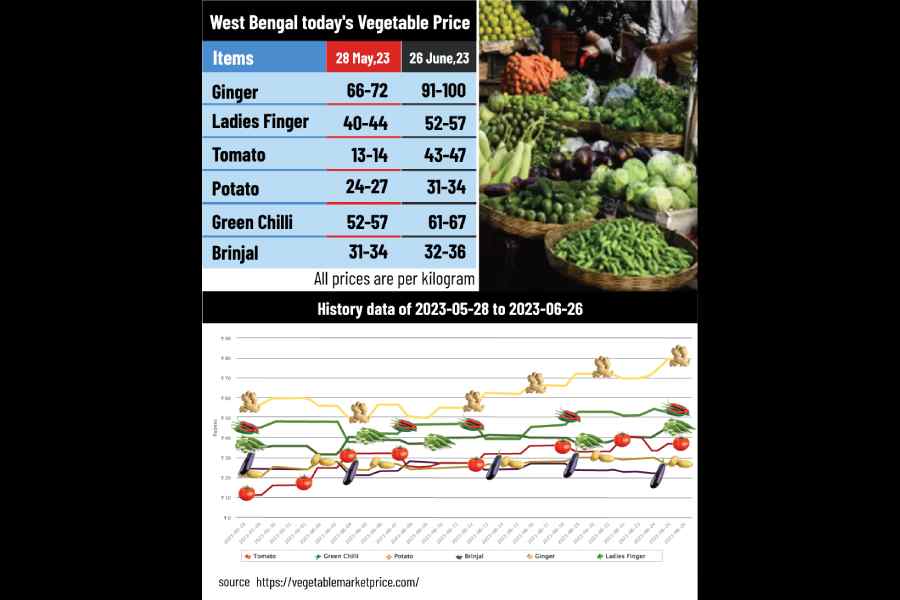I’m the bright red tomato/ In cool place on vines I grow/ My taste is tangy, my shape is round/ Flooding the markets/ I’m always found!
Or am I?
Given that prices of tomatoes in retail markets in Bengal have shot up to Rs 43-47 a kg (Rs 44-Rs 61 in shopping malls) from its retail price of Rs 13-Rs 14 a month ago, the popular primer may not sound so good to the average ear.
In fact, kitchens in middle-class households in Bengal, and pretty much across the country, are on fire because prices of essential vegetables – from ginger, ladies finger, green chilli to brinjal and even potato – have shot through the roof in the last couple of weeks.
While market watchers blame the scorching summer heat for the abnormal price hike for most vegetables, political and ethnic turmoil in Manipur were held responsible for the abrupt spike in prices of ginger.
Market experts opine that prices of most vegetables are likely to stabilise in the next couple of weeks on account of the advent of monsoon in most parts of India. However, the price of ginger may not slide anytime soon given the transportation bottleneck on account of the persisting violence in Manipur is unlikely to ease in the near future, they say.
“The production of vegetables like tomato and ladies finger suffered badly in the wake of the unprecedented rise in summer temperatures this year. The leaves dried up and wilted in the heat, destroying the crops. The demand-supply gap has pushed up prices. Now that the rains have arrived, we are expecting the local production of these vegetables to go up and the prices to come down,” said Rabindranath Koley, a member of the Bengal government’s agri-marketing task force which monitors and regulates crop prices in the state’s retail and wholesale markets. Chief minister Mamata Banerjee chairs the task force, now in place for over a decade, which reportedly meets at regular intervals to keep prices under check.
“For ginger, Bengal is mostly dependent on the north-eastern states which supply a bulk of its produce to states like us. But the Manipur unrest has led to major logistical hassles in terms of transport services getting affected. We are not sure when that would get sorted. We also procure ginger from the south, but the quality is not as good as that of the north-east,” Koley, also a representative of the state’s federation of vegetable traders in the state task force.
Koley, however, expressed surprise when informed that the daily retail price charts showed that potato was selling at Rs 30-Rs 32 a kilo in Calcutta. “That’s very abnormal. Potato prices were at Rs 18 a kg only a couple of days back. There is enough potato in the cold storages of Bengal and there’s no reason why prices should go up. We will monitor this immediately,” he said.
The task force member said that the committee would draw the attention of state agriculture marketing minister Becharam Manna about some of the abnormal veggie price hikes in recent times and suggest ways to check them. “A substantial amount of the state’s vegetable produce is exported to the middle east. Maybe we should seek the intervention of our chief minister to curtail our exports as a stop gap measure to normalize domestic prices,” Koley said.










